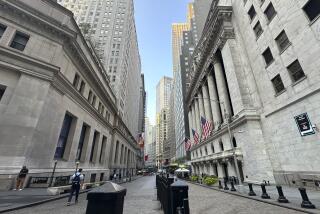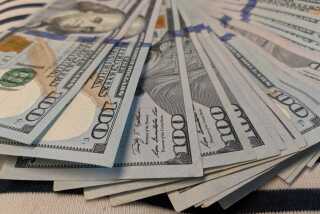More Doubt Cast on Cloning Safety
- Share via
Can anything stop the dollar?
The U.S. currency surged Thursday to an eight-month high against the euro and a three-month high against the yen as traders continued to judge the U.S. economy’s prospects superior to its rivals’.
It took 83.64 cents to buy a euro Thursday in New York, down from 84.78 cents Tuesday and the weakest level for the euro since October.
Meanwhile, one dollar bought 125.77 yen in New York, up from 124.45 Tuesday and the most since 126.80 on April 2.
New York markets were closed Wednesday for the Fourth of July.
The fresh gains for the dollar came on the “perception we’re at the end of our slowdown cycle and Japan and the euro zone are still in the middle of it,” said Michael Malpede, currency analyst at Refco Inc. in Chicago.
A nation’s currency generally reflects global investors’ faith in--and willingness to invest in--its economy.
The dollar’s strength benefits the U.S. economy by keeping import prices down, thus helping to quell inflation. It also keeps U.S. investments attractive to foreigners by automatically boosting the value of those investments when translated into other currencies.
From the standpoint of U.S. exporters, however, the strong dollar presents a threat, as it makes their products more expensive abroad. U.S. manufacturers have asked the Bush administration to ease its backing of a strong dollar, and firms including McDonald’s Corp. and Nike Inc. have cited the dollar’s strength as a drag on earnings.
The euro was hurt Thursday after European Central Bank President Wim Duisenberg indicated the bank won’t cut interest rates further to help the economy. Europe has been battling rising inflation amid high energy prices and the weak euro.
Traders sold the euro on the expectation that European growth will continue to slow. A report Thursday showed German unemployment unexpectedly rose in June.
In Japan, the yen’s latest slump was tied to a report that Finance Minister Masajuro Shiokawa will urge the Bank of Japan to boost the money supply.
A move to flood the financial markets with yen probably would cheapen the currency, analysts say. But a drop in the yen could help the economy by boosting exports.
A weaker yen is “the only option that they have” to prop up the economy, said Carl Weinberg, economist at High Frequency Economics in Valhalla, N.Y.
More to Read
Inside the business of entertainment
The Wide Shot brings you news, analysis and insights on everything from streaming wars to production — and what it all means for the future.
You may occasionally receive promotional content from the Los Angeles Times.










